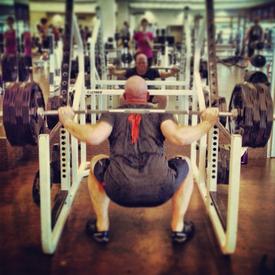Should it count toward my cardio?

tfisher679
Posts: 64 Member
I currenty work at a warehouse and I'm on my feet all day. I walk for about half of it and am lifting cases repeatedly several hundred times throughout the day. The cases weigh anywhere from 20 - 60 pounds a case. Should I be counting this towards my exercise? If so how because nothing's really continuos?
0
Replies
-
I think you should simply set you activity level to "Very Active: Spend most of the day doing heavy physical activity (e.g. bike messenger, carpenter)".0
-
Personally, if this is a regular part of your daily routine, I'd adjust your profile to reflect an active life style and it'll adjust your calorie intake - after that I'd record what activity is above and beyond that.
in my humble opinion...0 -
I think you should simply set you activity level to "Very Active: Spend most of the day doing heavy physical activity (e.g. bike messenger, carpenter)".
That's the easiest thing to do0 -
I count my activity @ work. I am a nurse on a busy floor, 12 hour shifts. I count all the walking I do as slow pace times so many minutes per hour. Out of 4 hours, depending on how much walking I really do, I claim 40-60 min of walking. And I claim 40-60 min of light, moderate effort house cleaning. If I do CPR or something strenuous like that, I count it as something else. This way I have credit for the walking, and patient care which equates to light/mod effort house keeping. Hope this helps. Exercise is exercise regardless of where we do it. See what you can find in the exercise section that may equate to what you do. Good luck!0
-
I think I do but I'll make some adjustment as needed. Thanks0
-
I would wear a HRM for the entire work day, for a week straight. Then do some math just so you know how much you're burning.
BRM/24 = Calories your body requires in an hour at a sedentary level.
Assuming you work a 10 hour shift
Calories your body requires in an hour * 10 = Calories your body burns naturally during those 10 hours you're working at a sedentary level. We'll call this figure X.
At the end of your shift...check how many calories you've burned. We'll call this number Y. Subtract X from Y to get an estimated calories you've burned specifically from the work.
Example
Today I did a bunch of yard work for about 5 hours. I wore my HRM. HR Average was 88 BPM, the high was 124 BPM...low impact but steady. Overall my HRM said I burned 1284 calories.
My BRM is 2660 according to MFP.
2660/24= 111
110*5 = 555
1284-555= 729 calories burned.
The reason I suggest doing this is so you do not overestimate your calories by choosing an activity level which is truly too high for what you're actually doing. If losing weight is your goal, It would be better to underestimate rather than overestimate. Do this for the week because there are probably days that you burn more than other days. Take the average across the week and you're safe to add that to your cardio.0 -
Just my opinion, but that is part of your lifestyle, I'd chose active or very active for your normal daily activity and not count it as cardio. Cardio is totally different in my opinion. I only count cardio as the times when I'm intentially focusing on pretty intense excercise to elevate my heart rate for at least 20 minutes straight. If you count yourself as active/very active plus count that as cardio, you may be overestimating your burn. And if you eat back your calories, you may be eating too much (depending on your goal).0
This discussion has been closed.
Categories
- All Categories
- 1.4M Health, Wellness and Goals
- 398.1K Introduce Yourself
- 44.7K Getting Started
- 261K Health and Weight Loss
- 176.4K Food and Nutrition
- 47.7K Recipes
- 233K Fitness and Exercise
- 462 Sleep, Mindfulness and Overall Wellness
- 6.5K Goal: Maintaining Weight
- 8.7K Goal: Gaining Weight and Body Building
- 153.5K Motivation and Support
- 8.4K Challenges
- 1.4K Debate Club
- 96.5K Chit-Chat
- 2.6K Fun and Games
- 4.8K MyFitnessPal Information
- 12 News and Announcements
- 21 MyFitnessPal Academy
- 1.5K Feature Suggestions and Ideas
- 3.2K MyFitnessPal Tech Support Questions





